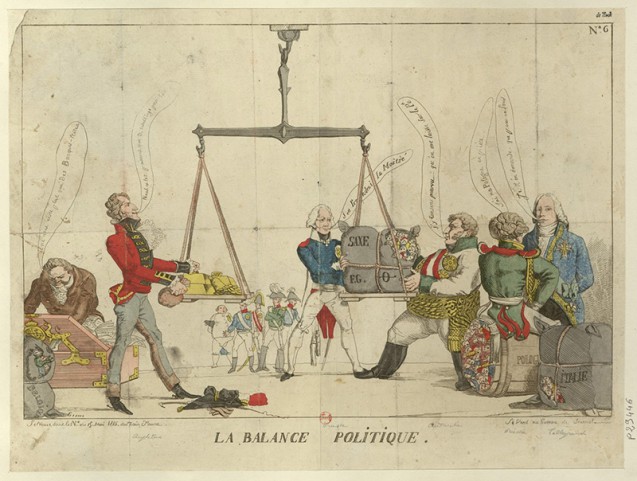After Napoleon’s first abdication, the victorious allies called a “general congress” with the aim of laying down the foundations of a new Europe, atop the ruins of that shattered by twenty-two years of war. It opened in November 1814 and lasted eight months, closing with the signing of the Final Act, on 9 June, 1815.
The congress was directed by the four main powers – the United Kingdom, Russia, Austria, and Prussia – with Chancellor Metternich as President. There were in addition several hundred delegates from all the states that still existed or that had disappeared, and the aim was to work together to re-establish an equilibrium or balance of forces on the European continent, guaranteed by what was christened the “European Concert”. Defeated France, represented by Talleyrand, was allowed to participate in the congress. The congress participants hoped to redraw the map of Europe, synthesising the old and the new, redefining zones of influence, instituting principles of legitimacy and sovereignty recognised by all the participants, but also modernising international law by creating common norms and bodies designed to ensure that the decisions taken would be lasting. They even invited the princes to give their states constitutions, in a sort of backhanded compliment to the French Revolution and the Empire, implying that not all the novelties brought about by them were to be rejected. There’s no denying it, they got through a colossal amount of work in a handful of months.
The negotiations did not always go smoothly. There were fallings out and even serious crises, with war almost breaking out again, over Poland and Saxony (February 1815). After having lost a good deal of time in confrontation, the diplomats concluded their work under the pressure of the return of Napoleon. The ceremony of the signing of the treaties took place a few days before the battle of Waterloo, and the results achieved were considerable; though, you could almost argue that it was the Emperor who saved the congress from itself. Be that as it may, in addition to the territorial agreements, the congress created the embryo of international law, notably via the proclamation of the freedom of circulation on the large and small rivers of Europe, via the new rules for diplomacy, and by the general abolition of the slave trade. France paid a high price: loss of all her conquests and to be put under close surveillance by the allied powers until the 1860s. The biggest winner of the negotiations was to be the United Kingdom. Thereafter, that country had no rivals in the acquisition of colonies and had complete control of the trading routes. As for Russia, it gained full admission to the concert of Europe and received a part of Poland. Austria, for its part, was authorised to occupy northern Italy and the Balkans. As for Prussia, in order to prevent it from dominating all the northern German lands, it was allowed to keep the annexations it had made on the Rhine, a situation which would (much later) push Prussia to oppose Austria (the war of 1866) and France (the war of 1870) in an attempt to unify German lands. Nevertheless, we cannot lay the blame for future disasters entirely at the feet of the participants at the Congress of Vienna: they did not know that fifty years later Prussia would become the great power in north eastern Europe and would swallow up the small and middling German states.
Perhaps, in the end, the only unequivocally good result of the Vienna Congress was the prevention of a general war in Europe for a whole century, something that had (almost) never happened before, and has not (yet) happened again.


